Every 10d
Recommended Frequency
1 /2 cup of water
Recommended Amount
Make sure the soil dries out between waterings, and then water well. Watch for drooping leaves, as this is an indicator that your plant needs watering.
Every 30d
Recommended Frequency
Fertilize your Chinese Money Plant once a month during spring, summer, and autumn using an all-purpose 20-20-20 fertilizer diluted to half strength.
Indirect Sun
Recommended
Indirect Sun or Filtered Sun is when sun exposure is being filtered through a sheer curtain or is not able to have the sun's rays directly hit the leaves/flowers of your plant.
Every 730d
Recommended Frequency
Repot your Chinese Money Plant every two years, or once it outgrows its pot.
For the Chinese Money Plant, maintaining an ideal temperature range between 60 to 75 degrees Fahrenheit is crucial for its health and growth. This range ensures the environment is neither too cold nor too hot, providing ...
Sandy Soil
Recommended Soil
Peat Soil is an acidic soil that retains a lot of moisture and slows decomposition. Due to such a high moisture retention this mix may require irrigation to help with draining. This soil type is best used when paired wit...
The Chinese Money Plant (Pilea peperomioides) thrives best in environments with humidity levels ranging from 40% to 80%, averaging around 60%. This range indicates that the plant prefers conditions that are from average ...

Shop Chinese Money Plant
Questions about Chinese Money Plant
The Chinese Money Plant, scientifically known as Pilea peperomioides, is a popular houseplant native to the Yunnan Province of China. It's cherished for its unique, round, coin-shaped leaves, which have earned it nicknam...

Toxicity of Chinese Money Plant

Common Pests and Diseases
Root Rot
Overwatering
To address root rot, start by removing the plant from its pot and trimming away any black, mushy roots. Allow the healthy roots to air dry before repotting in fresh, well-draining soil. Ensure the pot has adequate drainage holes. Going forward, water your Chinese Money Plant only when the top inch of soil feels dry to the touch, and avoid letting the pot sit in standing water. Monitoring soil moisture before watering can prevent recurrence.
Curling Leaves
Underwatering
To address curling leaves due to underwatering, ensure you establish a consistent watering schedule. The Chinese Money Plant prefers its soil to be slightly moist but not waterlogged. Water the plant thoroughly once the top inch of the soil feels dry to the touch. During warmer months, you might need to water more frequently. Always check the soil moisture level before watering to avoid overwatering. Additionally, using a pot with drainage holes can help prevent excess water accumulation.
Mealybugs Infestation
Mealybugs are small, soft-bodied insects covered with a white, waxy substance. They typically infest the undersides of the leaves and stem joints, sucking sap and weakening the plant.
To combat mealybugs, start by isolating the infected plant to prevent the pests from spreading. Use a cotton swab dipped in rubbing alcohol to dab directly onto the mealybugs, effectively killing them on contact. For larger infestations, rinse the plant with a strong stream of water to dislodge the pests, then apply neem oil or insecticidal soap as a foliar spray, thoroughly covering all parts of the plant. Repeat the treatment every 7-10 days until the infestation is cleared.
Leaf Curling
Environmental stress
Leaf curling in Chinese Money Plants can often be a sign of environmental stress, such as too much direct sunlight, extreme temperatures, or low humidity. To remedy this, place your plant in a location where it receives bright, indirect light. Avoid placing it near heat sources or in drafty areas. Increasing humidity around the plant can also help; this can be achieved by placing a humidifier nearby, grouping plants together, or using a pebble tray filled with water placed under the plant's pot.

Related Plants
Other Articles:
Top 10 Most Popular Roses
Mar 22, 2022
How to Care for China Roses
Mar 11, 2022
How to Care for Chinese Money Plants
May 15, 2020
How to Grow and Care for A Bird of Paradise
Apr 26, 2020
Top 10 Plants To Grow In A Terrarium
May 31, 2022
How to Grow and Care for Lucky Bamboo
Mar 29, 2022
How to Grow and Care for Corn Plants
Mar 29, 2022
How to Care for Madagascar Dragon Trees
Mar 21, 2022



